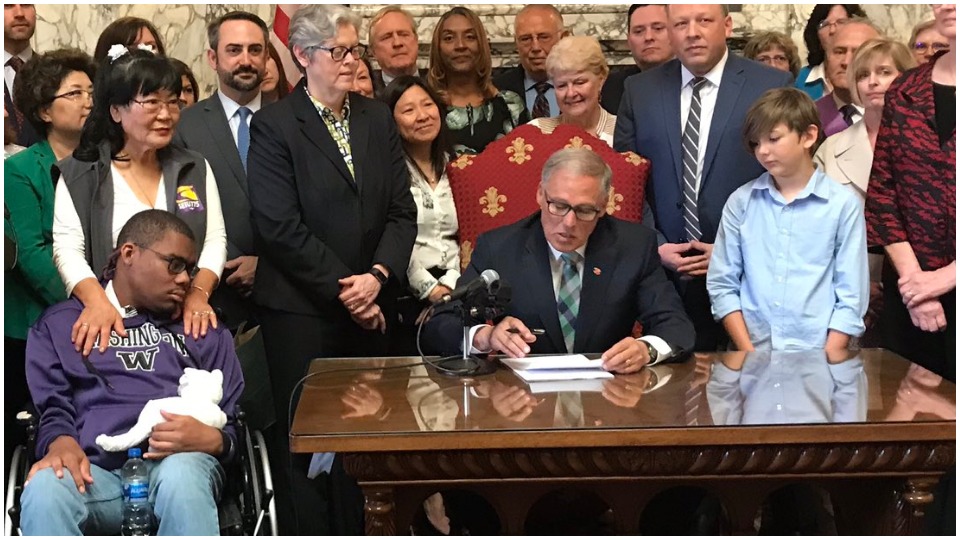
SEQUIM, Wash.—Gov. Jay Inslee signed into law the Long Term Care Trust Act (LTCTA) in Olympia a few days ago even as Rep. Derek Kilmer, D-Wash., introduced a bill in the nation’s capital to protect rural health clinics, like the walk-in clinic here, from devastating Medicare cuts inflicted by the Trump administration.
It is a war on two fronts, a case of government giving with one hand and taking away with the other.
Advocates of senior citizens and people with disabilities are cheering the enactment of the Long Term Care Trust Act approved April 16 by a 26 to 22 vote in the State Senate. One Republican broke ranks and voted with the Democratic majority, while three Democrats crossed over and voted with 19 Republicans against the LTCTA.
The measure will provide $36,500 or $100 for 365 days for the care of elderly or infirm people. The money will come out of a trust fund that draws its revenues from a payroll tax of 58 cents for every $100 of earned income.
It is far from perfect since the first benefits will not be paid until 2025. Some employees may be able to access benefits if they have worked continuously for three of the last six years but otherwise, workers will be able to draw benefits once they have paid into the program for 10 years. And the $36,500 cap is woefully inadequate if the person in need of care must be placed in a nursing home or in assisted living at $10,000 per month.
Even so, it is the first program in the nation to assist those in need of long term care that often forces them into bankruptcy. Robby Stern, a leader of Puget Sound Advocates for Retirement Action (PSARA) predicted that long term care will be a major issue in the 2020 elections. PSARA is a strong supporter of “Medicare for All” legislation introduced by Rep. Pramila Jayapal, D-Wash. Her bill adds long term care to Medicare, a benefit not now provided under that program.
Meanwhile, at the instigation of President Donald Trump, the Centers for Medicare Services (CMS) last November imposed a so-called “site neutrality” cutback that slashes Medicare reimbursements for multi-campus rural hospitals like the Olympic Medical Center (OMC), a public hospital in Port Angeles, by 60 percent. It is the sole full-service hospital on the Olympic Peninsula, its employees represented by Hospital Workers Local 1199.
OMC opened in 1951 with grassroots support of the labor movement, much of it organized by Vivian Gaboury, leader of the Communist Party of Clallam County. Her husband was a union construction worker, and her son, Fred Gaboury, a union logger. Loggers, farmers, longshore, and mill workers for decades had died or been seriously injured with no nearby hospital to treat them.
The CMS cuts are aimed at OMC’s satellite walk-in clinic located in Sequim, 17 miles east of Port Angeles. It would cut Medicare reimbursements from $118.35 to $47.35 per patient visit for any clinic that is more than 250 yards from its parent hospital. OMC estimates it will mean a loss of $47 million in funding over the next ten years. More than fifty rural hospitals across the nation, many in regions that voted for Trump in 2016, are targeted.
Rep. Kilmer, whose Congressional District includes Clallam County, introduced HR-2552 to halt this cut. The co-sponsor of the legislation is Rep. Elise Stefanik, R-N.Y. Kilmer visited the OMC in Port Angeles last week to unveil the legislation.
“The administration has put forward a policy that will hurt access to care in rural areas and kill jobs,” Kilmer said. “Hospitals should be encouraged to bring their services closer to the people they care for, not be penalized for it.”
Eric Lewis, CEO of OMC, told reporters, “CMS made the worst decision I have seen in my career, even though Clallam County residents, community organizations, and providers sent in 1,780 letters to CMS to make the case that local health care is important to Clallam County…. We will not give up without a fight.”
OMC is one of three rural hospitals across the nation that filed a lawsuit to block the CMS cuts. Over fifty rural hospitals have joined in the lawsuit.
OMC’s Sequim clinic served 20,000 patients last year, including this writer, who went there with an excruciating toothache on a weekend when no dental office was open. The woman doctor on duty examined my throbbing tooth and prescribed a painkiller and antibiotic. The pain went away in an hour or so.












Comments